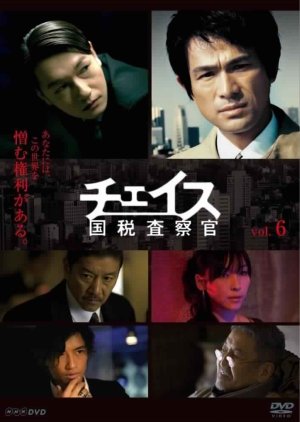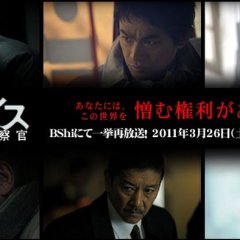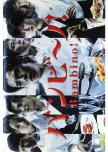 A Stalker's Guide to Eguchi Yosuke
A Stalker's Guide to Eguchi Yosuke It's a story about a veteran tax bureau inspector, Haruma Sosuke and a skilled tax evasion consultant, Murakumo Shuji. Haruma always thought that the tax evader's world and his modest life had nothing to do with each other, but one day they would become connected... Edit Translation
- English
- Español
- magyar / magyar nyelv
- dansk
- Native Title: チェイス~国税査察官~
- Also Known As: Chase: Kokuzei Sasatsukan , Cheisu: Kokuzei Sasatsukan , Chase: National Taxation Inspector
- Screenwriter: Sakamoto Yuji
- Director: Noda Yusuke, Ohashi Mamoru
- Genres: Thriller, Mystery, Drama
Cast & Credits
- Eguchi Yosuke Main Role
- LilySawano AyakoSupport Role
- Aso KumikoKawashima KaoriSupport Role
- Machida MarieUchikura WakabaSupport Role
- Sato JiroZaitsu ShigetoshiSupport Role
- Iura ArataMurakumo ShujiSupport Role
Reviews

TL:DR: This is a fast-paced business-investigation drama driven largely by Arata and Eguchi, in which Arata shines offering a powerful performance. The context is tax evasion so you can expect some unfamilar jargon. Don't let it put you off; the context doesn't really prevent the viewer from getting into the flow of the narrative.
I was really unsure whether I would like this story. The first episode opened with this very specific context and language used threw me back a little. But as the story progressed I forgot about it and found a different focus: the fates of Eguchi and Arata. The context is still important, though. You also get to see just how far could people go to avoid paying taxes.
Eguchi plays the tax inspector here. The drama opens as he investigates the case that sparks the entire chain of events. Gradually, he is led to discover some rather precarious truths. He also has a personal interest in this investigation, which adds to his determination. Eguchi's presence on screen is very strong without being artifical; I had a sense that he was where he belonged, simply, as if being in that role was what he was meant to do. His character is relatively straightforward, a little too rigid at first and not terribly complex. He does eventually see that perspectives are relative and boundaries between them a little more fuzzy than he may have hoped. We follow him as he makes new discoveries and it's kind of fun to see what he makes of things and how he fumbles along the way.
But this show is actually a little less about him than about his antagonist, portrayed by Arata. Arata really shines in this drama, offering exceptionally powerful and emotional performace. His character is scarred in many ways. He's very human as we get to see. He's a very well-fleshed out antagonist who is as important to the story as Eguchi.
It's actually hard to call Arata an antagonist. The drama tries to avoid simplistic distinctions between good and bad and everything in the drama is questioned either by the characters themselves or by the characters who surround them as a result of events that unfold. Although we follow Eguchi in his investigation, Arata's perspective is strongly focalised as well to the point that we are driven to strongly empathise with him. For the most part it is Arata who holds all the cards and Eguchi is the one playing blind chase. However he gains control towards the end of the story. It makes the story balanced between the two of them. There is an element of revenge in this drama as well but it doesn't completely take over the story.
There is a quote in the drama which returns at least once or twice, like a haunting refrain: "One man's fire of despair is another man's fire of hope". The quote, to me, conveys several things: the sense of double narrative, the sense of simultaneity and chain links between actions and their effects. One man's actions are bound to affect the life of another; and what leads to despair for one, provides hope for another; the drama plays on how those two are closely intertwined and the fact thtat there is a thin line separating them. What is hopeful can become despair and despair can turn into hope.
While Arata and Eguchi carry the whole show, side characters are not unimportant since they meaningfully contextualise the frames of mind of both protagonists and highlight their strengths and weaknesses. It's particularly interesting to see how Arata's character treats and responds to the people around him.
The drama is also very good at creating ambience. They didn't use many camera tricks but when they did, I felt it was to meanigfully reflect the mood at a given point in time, to show a character'a tension or sadness. The music used is meant to be haunting. Pacing is even throughout the entire story. It starts fast and keeps going right towards the end. There are a lot of things happening all the time; the drama offers a good example of keeping good proportions between pacing and overall length of the story; no time is wasted.
The plus of this drama is that, like most Japanese dramas, it offers character motivations and backstories to bite into, but never becomes maudlin in doing so. Perhaps the ending may be seen as a little more teary in contrast to the rest of the drama but overall the ambience the drama has built throughout is never lost. I personally find the ending a bit abrupt but because of what happens there is not much left to tell either so to continue beyond the point in which the story ends may water down the impact of the whole narrative.
Much as I do rewatch dramas, it's always difficult to evaluate how rewatchable a drama is without actually rewatching it. I'd say once is enough for this one because the story is satisfying but I would rewatch it to see if I react to Arata in the same way and perhaps to see if I haven't missed any meaning-altering nuances. I am the type who likes to philosophize a little, so when I rewatch I look for the things I missed that could lead me to more meaningful speculations and debates.
I found this to be a very "meaty" story overall and Arata...Arata will likely haunt me from now on.
Was this review helpful to you?
Recommendations
There have been no recommendations submitted. Be the first and add one.



















































